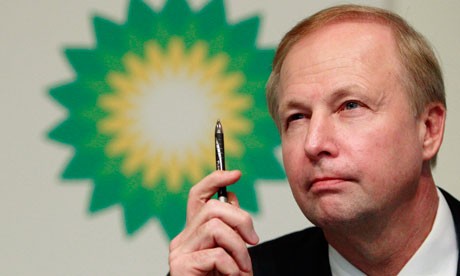China Ramps Up Offshore Wind Projects After Slowdown
(Bloomberg) — China has rebuilt a substantial pipeline of offshore wind projects as the sector recovers from a slowdown that followed the end of national subsidies in 2021, according to...

Image by Alastair Grant/AP
LONDON — BP PLC shares fell Tuesday amid investor frustration at the company’s growth strategy in the wake of the Gulf of Mexico oil spill and disappointing second-quarter results.
Chief Executive Bob Dudley said BP isn’t about to break itself up, as some analysts have suggested, adding his top priority is to stabilize the company after last year’s Deepwater Horizon disaster.
He said he understood investors’ impatience with theshare price, which has barely budged this year and shows no sign of returning to its pre-Gulf-spill highs. But he said there was no need for a “knee-jerk reaction to suggestions that are thrown out into the market.”
“We. . .have to have the patience to embed safety, risk management, get our operations working with a different culture and structure,” he said. “That requires patience and persistence.”
But Mr. Dudley indicated that BP might consider a restructuring at some point in the future. Asked if it might split off its refining division, as ConocoPhillips has done, he said “we’re not ruling it in or out.”
Analysts were disappointed. “BP appears to be running a business-as-usual strategy and we are not convinced that the market will put up with this for much longer,” said Dougie Youngson of Arbuthnot Securities.
BP said its clean-replacement-cost profit, a closely watched figure that strips out gains or losses from inventories and other nonoperating items, was $5.6 billion in the second quarter, up 13%but below most analysts’ expectations. The company’s net profit was slightly higher than that at $5.62 billion, compared with a $17.15 billion loss last year related to the Gulf spill.
Revenue rose 37% to $103.85 billion from $75.87 billion.
Meanwhile, oil-and-gas production stood at 3.43 million barrels a day — 11% lower than in the same period last year, partly due to the effects of the drilling moratorium in the Gulf of Mexico and divestments of oil fields to pay for the spill. In London trading, BP shares fell 2.4% to 464 pence ($7.55) in response.
BP has struggled to recover from last year’s Gulf disaster, when an oil well it was drilling exploded, killing 11 men and triggering the worst offshore oil spill in U.S. history. The company has had to set aside $41 billion to cover the costs of the disaster, and BP’s share price is still about one-third lower than it was when the Deepwater Horizon rig blew up in April 2010.
Mr. Dudley, who took the reins at BP last October, has tried to put the company back on track — with mixed success. He overhauled BP’s structure, created a new safety-and-risk division, raised $25 billion from asset sales and restored the company’s dividend earlier this year — but at only half the level it was before Deepwater Horizon.
Meanwhile, a highly touted Arctic-exploration deal he engineered with Russian state oil company OAO Rosneft collapsed over opposition from BP’s partners in its existing Russian joint venture, TNK-BP.
Investors were disappointed that BP has so far not come up with anything to compensate for the loss of the Rosneft opportunity. “They shot themselves in the foot over Russia, and so far they haven’t found anything to replace it,” said Paul Mumford, senior fund manager at Cavendish Asset Management, which owns GBP 2.2 million ($3.58 million) of BP shares.
With frustration growing, some investors have called for the company to sell more assets, or even break itself up. Those calls intensified after ConocoPhillips announced earlier this month that it was splitting its refining and production arms into two separate companies.
But Mr. Dudley rejected comparisons with Conoco, which he described as a very different company with a different asset structure.
BP has already scaled back its downstream division, selling 10 refineries over the past 10 years, and has also announced plans to sell its huge U.S. refineries in Texas City, Texas, and Carson, Calif.
Iain Conn, BP’s head of downstream operations, said he “didn’t feel pressure” to move BP away from an integrated oil company.
Mr. Dudley said BP management shared investors’ “great sense of urgency around where our share price is.” But he said the company needed to focus on consolidation and stabilization — strengthening its balance sheet, reducing debt, improving its credit rating and building up its exploration portfolio.
– By Guy Chazan and Alexis Flynn, Dow Jones & Company

Sign up for gCaptain’s newsletter and never miss an update

Subscribe to gCaptain Daily and stay informed with the latest global maritime and offshore news


Stay informed with the latest maritime and offshore news, delivered daily straight to your inbox
Essential news coupled with the finest maritime content sourced from across the globe.
Sign Up